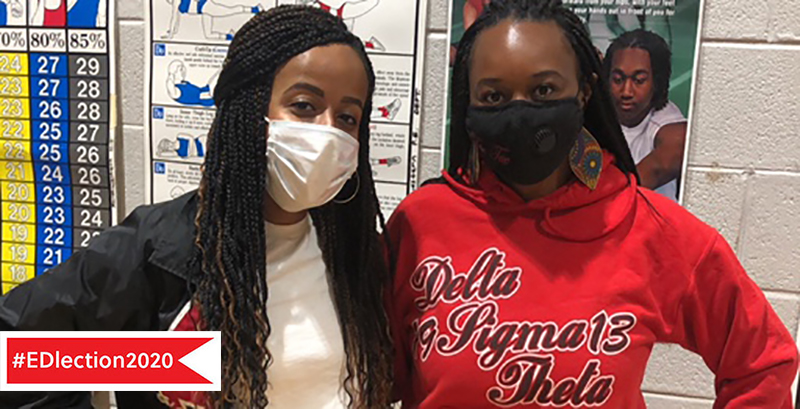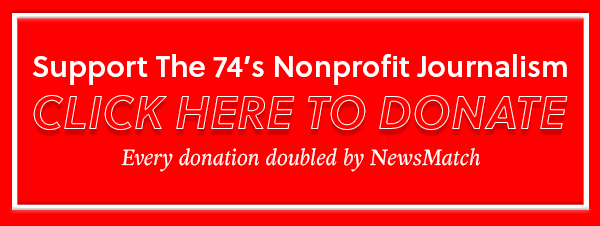What I Learned as a Poll Worker: Voting Matters, But Informed Voting Matters More

While diligently working to reauthorize the Voting Rights Act, former Congressman John Lewis once said that, “The vote is the most powerful non-violent tool we have in a democracy.” And while voting in our democracy matters, informed voting matters so much more.
In the midst of this year’s nationwide poll worker shortage due to the coronavirus pandemic, I decided to answer the call to serve our democracy by stepping away from my job as special projects and community manager at The 74 for a day and working as a poll worker, or election judge as they’re known in my local community in Prince George’s County, Maryland. Back in 2018, I co-founded Habeshas Vote, a nonpartisan voter mobilization and education initiative to empower Ethiopian and Eritrean Americans to get civically involved. My Ethiopian-American parents migrated to the United States when I was 2 years old and since then, have encouraged me to find meaningful ways to give back to our beloved communities. Through Habeshas Vote, I helped organize, educate and mobilize our communities to do more in this election cycle by phone-banking, canvassing, donating and safely serving in the places where they live and work.
That also meant I had to ‘walk the walk’ by doing the same.
I felt that if more people in our communities saw that younger and diverse individuals, who were actually reflective of them and their friends and families, were stepping up to be poll workers, then they might be more inclined to want to participate in the electoral process, too. It also turned out that my presence at the polls served another unintended purpose: translating for voters who speak Amharic—one of the major languages spoken in Ethiopia—who had a challenging time understanding the ballot. This allowed more voters to feel more empowered because they had more access to the information they needed to make a more informed decision, while also ensuring that they felt a part of our country’s democratic process overall.
Prior to this historic election cycle, I wasn’t fully aware of all of the contributions poll workers make to help ensure all of our elections are fair and free. Upon receiving my poll worker assignment one week before Election Day, I started to devise a plan of action for the actual day, including brushing up on my poll worker training materials, deciding which comfortable shoes to wear and figuring out how much coffee I would need to bring to help me endure the projected 16-hour shift. On Nov. 3, I arrived at my polling site in the gym at Northwestern High School at 5:45 am, to find that we still had plenty of tasks remaining to safely prepare our location for voting and decisions to make about who would be serving at each station prior to the polls opening at 7a.m.
Although we had a mandatory training session the evening before to review procedures and placement of stations and voting equipment, we were still trouble-shooting issues the next morning, one of them being the malfunctioning of our electronic poll books (it wouldn’t be on brand with 2020 if we didn’t encounter technological challenges). Once our polling site opened — 30 minutes late because of the polling book glitch — I spent the rest of my 16-hour shift distributing ballots to voters, assisting voters with the process as needed and helping close down our site once the polls closed at 8 p.m..
On top of spending months prepping for Election Day, other poll workers were also expected to do the painstaking work of counting each and every ballot and carefully checking signatures on mail-in ballots in what was a record-setting voter turnout where 148 million (and counting) votes were cast and 62 percent of eligible voters participated.
Going into this year’s election season, there was a lot at stake, at all levels of government. Voters were confronted with the opportunity to select their elected local, state and national officials and vote on a series of statewide and local ballot measures. However, despite the significant momentum that was placed behind the “Get Out and Vote” movement by almost every organization or business voters have ever frequented, there were still a lot of uninformed voters who showed up on Election Day.
I spent much of my time last Tuesday distributing and explaining ballots to voters. One of the moments that struck me the most that day was a conversation I had with an older white gentleman who, after receiving and looking at everything on his ballot, immediately gave me a defeated stare and finally exclaimed, “You practically need a law degree to vote!” Voting can already be a frustrating and intimidating process to some, and not understanding what’s on the ballot leads some voters to avoid elections altogether.
I witnessed some of these same issues with my own family in the 2018 midterm elections when my mom simply voted based on the popular candidate’s name while leaving part of her ballot blank because she didn’t know anything about the other races or ballot measures.
It doesn’t have to be this way. We can and we should invest in comprehensive voter education programs at all levels. At the K-12 level, educators should help students understand the history behind voting, the importance of voting in all elections and how voting ultimately impacts our personal and collective interests.
One resource that I turned to as I prepared myself and others to vote this year was Vote 411, a nonpartisan “one-stop-shop” for election-related information. Launched by the League of Women Voters Education Fund, this comprehensive voter guide helps voters learn about what’s on their ballot and even gives each user an opportunity to print the information to use as a reference for when they vote. In some of the outreach I completed on behalf of Habeshas Vote, I directed voters to Vote 411 to help them learn more about candidates and ballot measures specific to their districts.
The political repercussions of being an uninformed voter are far too great and frankly, many Americans—like the former Congressman John Lewis—have risked their lives to ensure that people like me would have the right to vote and have my interests represented. As much as a healthy democracy needs active participation in its civic engagement process, it desperately needs an informed and prepared electorate.
Get stories like these delivered straight to your inbox. Sign up for The 74 Newsletter

;)

